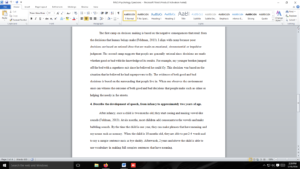Intelligence and abilities
Choose which type of mindset you most identify with, either fixed or growth, and explain how this mindset affects how you feel about your intelligence and abilities. What did you see modeled in your childhood home, and how does that shape your thinking today?
2. Choose one theory of intelligence presented in this unit, and explain what it means. What are the common characteristics of intelligent behavior? How can you tell if someone is intelligent?
3. Academicians studying decision-making generally fall into one of two camps. Those in the first camp believe that humans are essentially irrational and tend to make poor decisions in a variety of situations, often based on impulse, emotions, or circumstance. In contrast, members of the second camp argue that, although humans do sometimes make poor decisions, they are generally quite rational. Discuss the two camps of thought on human decision-making, and identify which you align with and why. You must support your beliefs with examples of various decision-making methods presented in this unit. What evidence is there that people tend to make poor decisions? What evidence is there that people tend to make good decisions?
4. Describe the development of speech, from infancy to approximately two years of age.
Requirements: Depth
Answer preview
The first camp on decision making is based on the negative consequences that result from the decisions that human beings make (Feldman, 2013). I align with camp because poor decisions are based on rational ideas that are made on emotional, circumstantial or impulsive judgment. The second camp suggests that people are generally rational since decisions are made whether good or bad with the knowledge of its results. For example, my younger brother jumped off the bed with a superhero suit since he believed he could fly. This decision was based on the situation that he believed he had superpowers to fly. The evidence of both good and bad decisions is based on the surrounding that people live in. When one observes the environment once can witness the outcome of both good and bad decisions that people make such as crime or helping the needy in the streets.
[630 Words]

Intelligence and abilities

